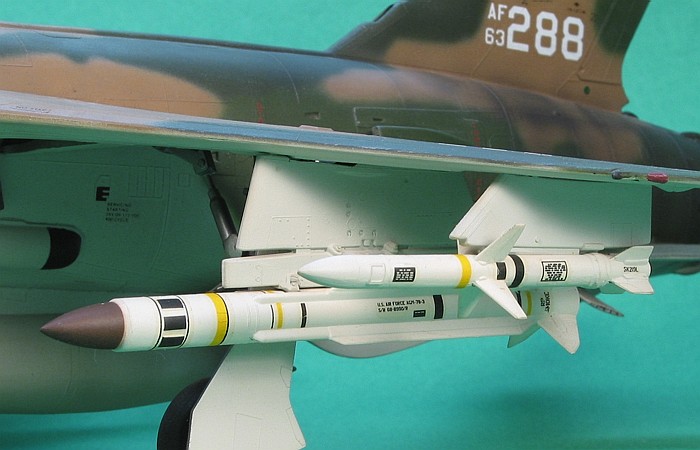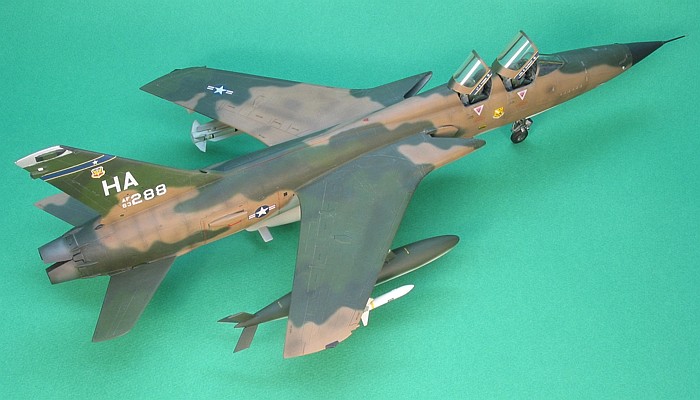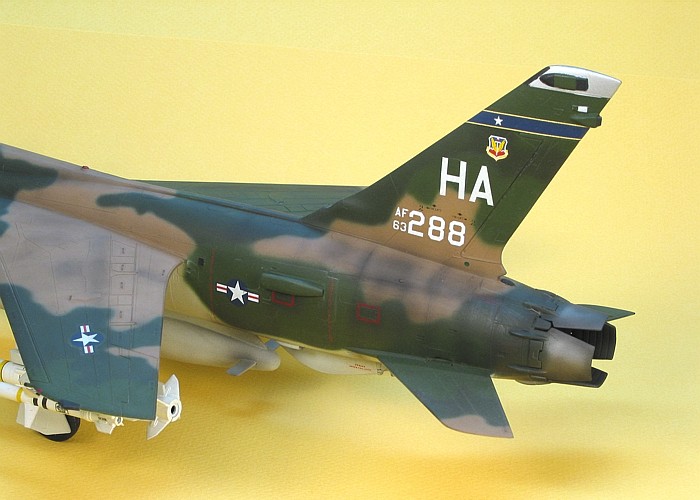The F-105G
Thunderchief was the first large scale production of a
dedicated Wild Weasel aircraft with around 70
airframes being converted to this version from existing
F-105Fs. The changes to the airframe were minimal, with
the large ECM blisters on the fuselage sides being the
only real indication that an aircraft is not just a
standard two-seat F-105F Thunderchief. A few smaller
antennae on the wing tips and around the nose completed
the external changes to the airframe. In the cockpit, a
couple extra display screens in the rear cockpit were
the only major changes.
Depending on the source, I have read widely varying
descriptions concerning the Weasel modifiations.
Some state the changes were significant to the
aircraft's mission and enabled it to do things a the
plain F-105F could not do. Other sources claim that the
changes were merely the incorporation of an ECM pod into
the airframe so that it would not take up one of the
weapons pylons. This provided for the F-105G to carry
one more weapons pylon's worth of ordnance, but left the
capabilities not much changed from an F-105F carriying
the ECM pod on one of its pylons.

Whatever the real story is on the modifiaction of the
F-105F to the F-105G, none dispute that the F-105G
Weasels played a vital role in the Vietnam conflict.
There were a lot of aircraft that made it to their
targets and home again because the Weasels were
there to run interference against all the missile
batteries that were intent on shooting them down.
Realistically, this is the oldest model in my
completed models collection. I have a few older built
models, but they are only around to remind me of how far
I have come in my modeling and are never placed onto my
display shelves.
When Monogram released this kit, it was the
state of the art in modeling. Detail&Scale
published their F-105 Thunderchief in Detail&Scale
book around the same time this kit was being released
and branded it as the best kit Monogram had ever
produced. That is pretty high praise. And, while the kit
is not as good as the current crop of "build themselves"
models from Hasegawa or Tamiya, this is
still a very good kit.
Detailing in the kit is well executed. The cockpit is
raised detailing. The ejection seats are simplistic, but
workable. The kit scribing is raised. Monogram
did their homework on the F-105G and correctly captured
all the Weasel specific antennae. In the later
releases of the F-105D and F-105F by Monogram,
these antennae become a problem as they were not present
on those airframes, but on the F-105G they are correct.

When I built the model, I could find little that
needed upgrading or changing. Hence, I kept it simple
and mostly out-of-the-box. The only things I did extra
were as follows.
- I added thottles in the cockpits.
- I added a second pilot figure with a
repositioned head.
- I used thin sheet styrene to put harneses on the
pilots, connecting them to their ejection seats.
- I replaced the lower engine exhaust pedal with
one stolen from a second kit that was not "drooped".
The weapons load consists of the kit provided AGM-78
Standard ARM missile on the left inboard pylon, balanced
with an external fuel tank on the right. The outboard
pylons each carry the kit provided AGM-45 Shrike
missiles. I also used the kit provided centerline fuel
tank.
The camouflage is the standard S.E.Asian scheme of
Tan (F.S.30219), Dark Green (F.S.34079), and Medium
Green (F.S.34102) on the sides and upper surfaces with
Camouflage Gray (F.S.36622) on the lower surfaces. I
used all Testors Model Master enamel paints. The
camouflage and markings are representative of the
practices used in the middle 1970's for units attached
to the US Air Force Tactical Air Command (TAC).
Sometimes I like to go off the wall and just build an
aircraft of my liking without care for being accurate to
a specific set of markings. This is one such model. As
such, the unit markings are total fiction with my name
stenciled on the canopy rails. Also, I like to name my
models, so I picked an appropriate sounding name for a
Weasel aircraft, Berserk, and
decaled it onto the nose. I used N-scale railroad
lettering decals for both my name and the aircraft's
name.

A note about the tail code -- I did not know at the
time I built this model that the tail code HA was
already in use by the Iowa ANG (174th
TFS / 185th TFG). Had I
known, I would have chosen a different tail code for
this model. The Iowa ANG never flew the F-105.
One point of accuracy about the model, though, is the
aircraft serial number. It is the correct serial number
(63-0288) to claim the two MiG kills applied below the
windscreen on the left side of the nose.
This is the first model I built that started using
what is now my standard style for aircraft weathering. I
used a combination of thinned down enamel paint washes
and air brush shading to weather the airframe. This was
completed by a final dry brushing of silver to pop out
the surface details. For a more complete discussion of
what I do to weather my models, see my posting on
"Weathering Aircraft".
Home
| What's New |
Features |
Gallery |
Reviews |
Reference |
Forum |
Search